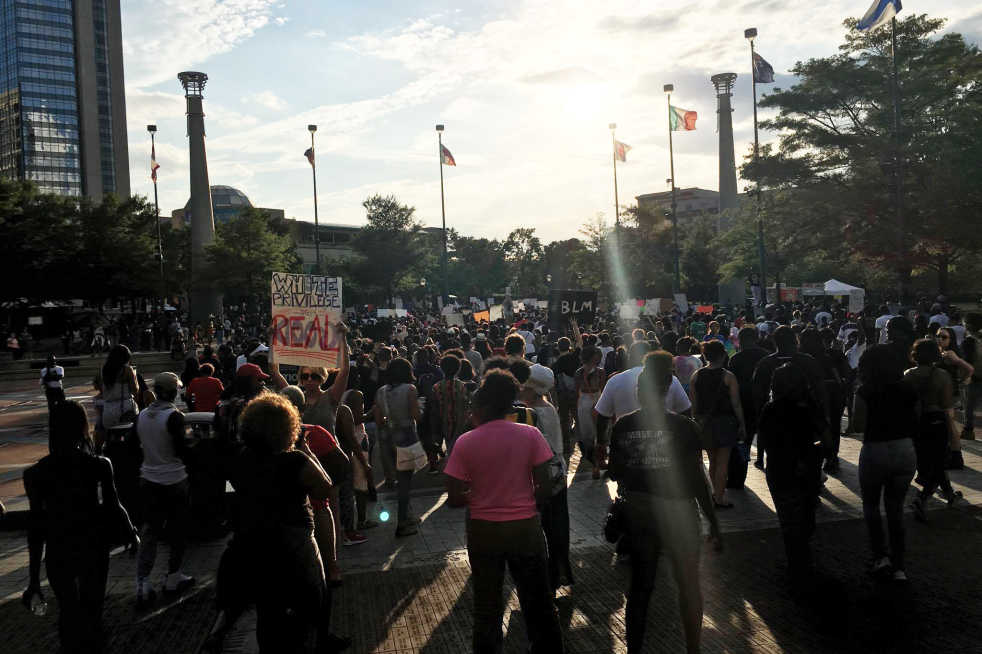On Nov. 24, 2015 a grand jury came to the decision to not indict Officer Darren Wilson for shooting Michael Brown, an 18-year-old African American teenager, on Aug. 9, 2015 in Ferguson, Missouri. On Thursday Jul. 17, 2014, Staten Island resident Eric Garner was put in an illegal chokehold by NYPD Officer Daniel Pantaleo and died shortly afterwards.
The decisions of these two now infamous cases has brought about the question for many Americans whether or not the confrontations between these African American men and white police officers is a racial issue, marking the latest chapter in America’s age old fight for civil rights.
The root of the #BlackLivesMatter movement can be traced to the acquittal of George Zimmerman — a volunteer officer for his local law enforcement — after evidence showed Zimmerman shooting 17-year-old Trayvon Martin in Sanford, Florida. Upon the seemingly back-to-back deaths of Brown and Garner, the #BlackLivesMatter movement was pushed to the national stage.
On the morning of July 8, the body of a 22-year-old male by the name of Michael George
Smith Jr. was found hanging from a tree near the Nelson Mandela monument in Piedmont Park. There were countless protests sparked all across the city, each becoming increasingly more violent. Citizens, with a great many Tech students among their ranks, demanded to know the identity of the young man.
“There were a lot of college students, and I know that [it] was led by a sorority from Spelman,” student Hillary Nicole said of a recent demonstration through Peachtree Street. “I felt bad about blocking the streets, but then I realized that was kind of the point. I don’t think people protest just because they’re upset. I think protests are held on populated streets like [Peachtree] to get people’s
attention.”
In a response to the protests rising across the city, Mayor Kasim Reed stated that citizens should “not prejudge the circumstances surrounding this young man’s death.” He even pledged that police would “share all evidence discovered in the course of the investigation.”
To ensure that Atlanta and its police department would not be subject to the scrutiny facing other cities, Reed and local Black Lives Matter leader Mary Hook met on a live broadcast on WSB-TV for the “Atlanta Unite” town hall meeting. Hook presented Reed with a series of demands, with Reed expected to respond by the beginning of August.
Reed’s cooperation is a good sign for politically active college students who are eager to have their voices heard but want to avoid the violence and antagonism that has marred demonstrations in other cities.
“I used to think that protests were pointless,” said Nicole. “[Now] I think they’re meant to create empathetic conversation in the community. I also think that it’s important for college students to be active in civil rights. It’s our future that [older] activists are fighting for.”
Fourth-year AE Moose Lundy’s thoughts are similar, stressing the importance of millennial activity in the fight for social justice.
“It’s very important for the younger generation to be involved in activism,” he said. “We have a lot more energy, we have fresh new voices and ideas, we’re in positions where we are willing to learn, and it is our immediate future at stake.”
While some groups continue to protest throughout Atlanta’s streets, a majority of our city’s Black Lives Matter societies agreed to a brief ‘cooling off’ period, considering Reed’s attention a good start to getting their voices heard by Atlanta’s higher-ups.
Considered by many to be the largest Progressive bastion in the southeast, Atlanta and students from schools like Tech and Georgia State should prove to be mainstays in this chapter of American civil rights history and beyond.
